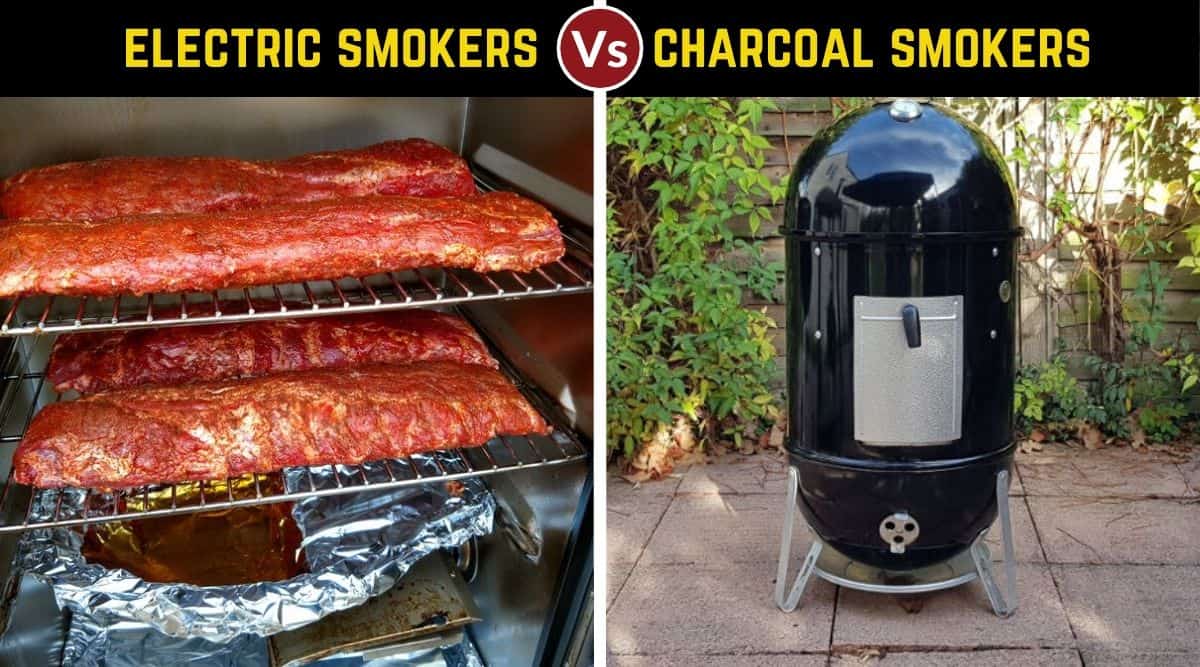
Perhaps it’s some kind of primal instinct, a hold-over from the days when our ancestors lived in caves instead of condos, but most of us love the smell and taste of smoked food.
Or smoked anything, for that matter; I have a phenomenal hand soap that smells like lavender and smoky, toasted marshmallows. Don’t judge.
So, if you’ve decided enough is enough, and you want that prehistoric goodness on demand, then you’re ready to get a smoker of your own. But, which kind to buy?
By now you’ve probably already discovered there are 3 categories of smokers: electric, gas, and charcoal.
How are you supposed to know which is right for you? You check the internet, of course! Your search brought you here, and we won’t disappoint.
In this article we’re going to compare two categories of smokers — electric and charcoal.
By the end of this guide, you’ll have a clear idea on which of electric or charcoal smokers might be right for you. We then invite you to check out our other comparison articles — electric vs gas smokers, and gas vs charcoal smoker — to make your final selection.
We considered cramming it all into one guide, but it became too long, unwieldy and hard to follow, so we broke it up into three separate discussions looking for the best BBQ smokers in 3 different comparison articles.
Anyway, enough small talk, let’s get into the details. Smoky goodness is coming your way!
Jump to:
- 1 Electric Smoker General Overview
- 2 Charcoal Smoker General Overview
- 3 Electric vs Charcoal Smoker: Comparison Table
- 4 Charcoal Vs Electric Smoker: Contrasts and Comparisons
- 4.1 Quality and Consistency of Finished Foods
- 4.2 Ease of Use and Convenience
- 4.3 Versatility
- 4.4 Temperature Range — High Heat and Low Heat
- 4.5 Size, Footprint and Space Required
- 4.6 Cooking Capacity
- 4.7 Reliability
- 4.8 Bad Weather Effects
- 4.9 Maintenance Required
- 4.10 Initial Cost to Buy
- 4.11 Ongoing Cost to Run
- 4.12 Popularity and Community
- 5 Electric Smoker Summary — and Who Should Buy One?
- 6 Charcoal Smoker Summary — and Who Should Buy One?
- 7 Our Top Pick is…
Electric Smoker General Overview
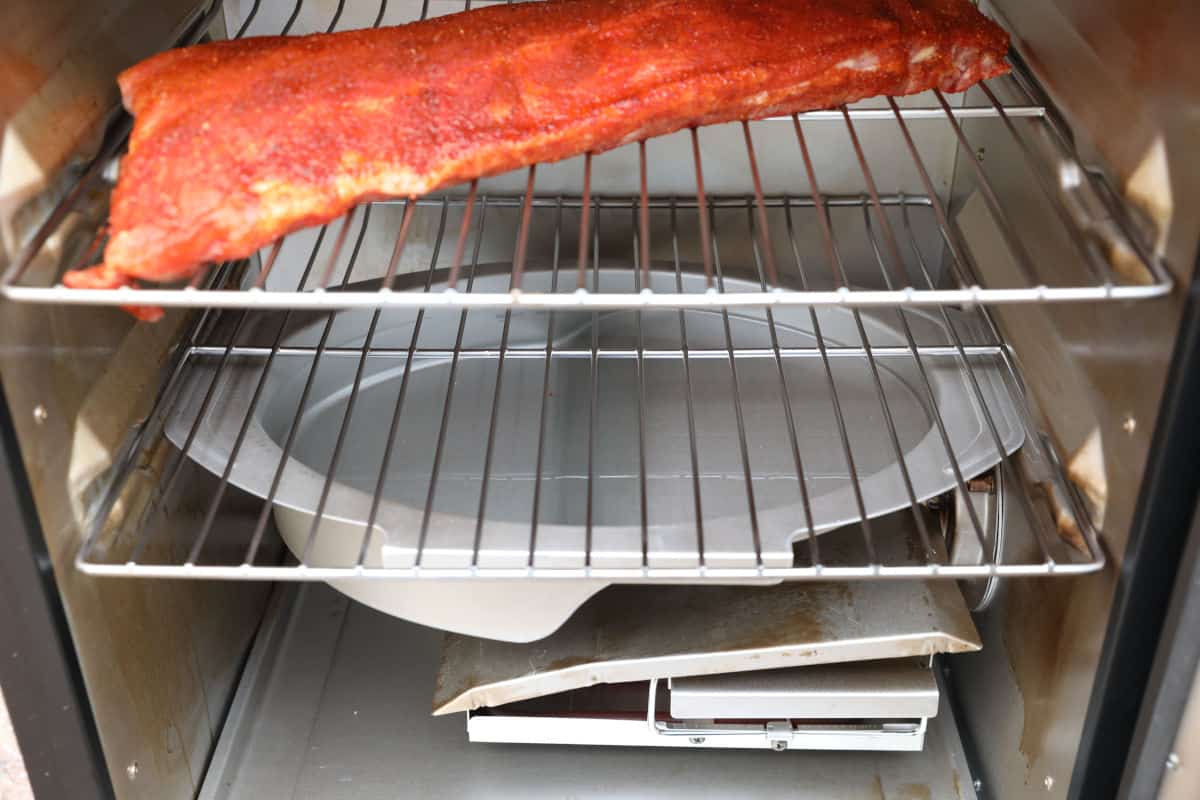
By far one the best smokers for beginners due to their incredible ease of use, instead of using an open flame, electric smokers rely on a heating element near the bottom to set wood chips (or pellets) smoldering.
The combo of heat and smoke generated cooks and adds flavor to whatever food you set on the racks in the upper chamber of the vertical-style smoker.
If you can operate an electric oven or cook plate, you can use an electric smoker.
The learning curve is pretty mild for plug-n-play smokers. Holding your temperature is simple, especially if you opt for a digital model, which we certainly recommend, because you set a temp, and it hits then stays there. It couldn’t be easier.
We discuss the benefits of electric smokers are in far more depth in our article are electric smokers any good?
Charcoal Smoker General Overview
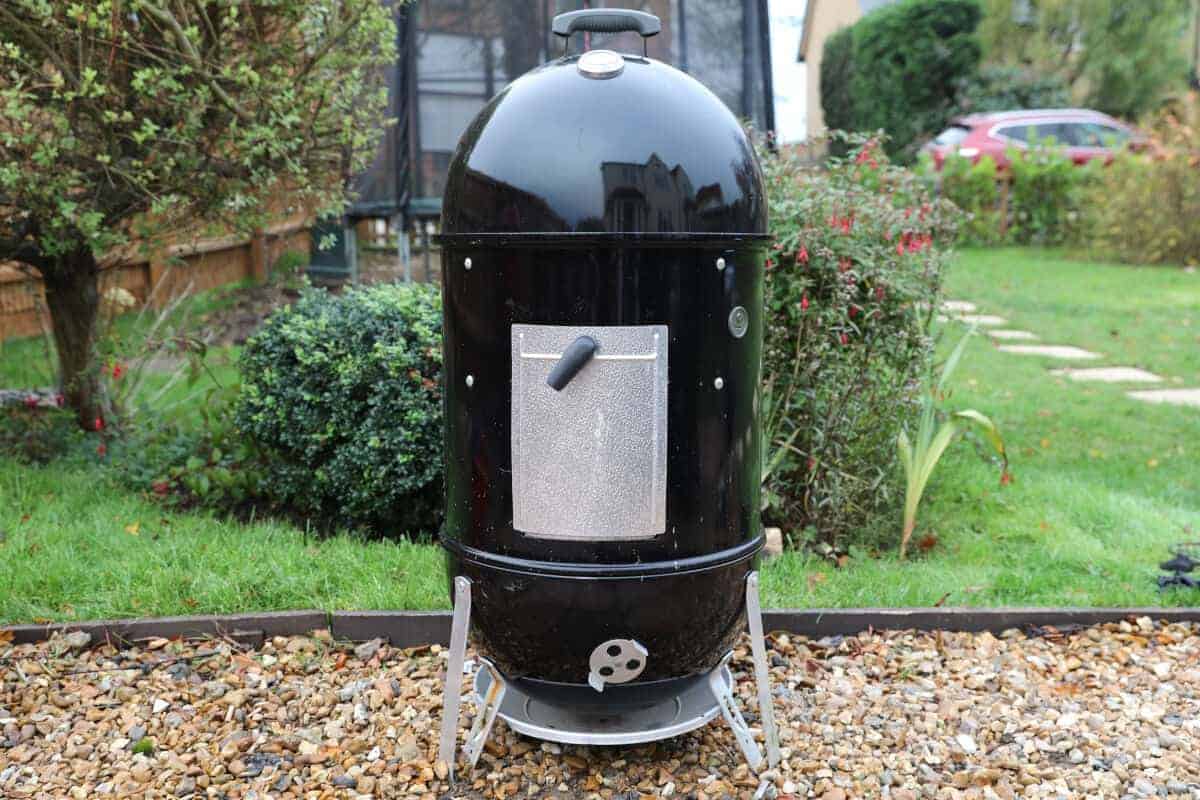
Of the three types, charcoal smokers are the most basic.
Good old charcoal burns at the bottom of the smoker (or the side, if it’s an offset smoker) to generate heat, and flavored wood chips or chunks burn right on top of it creating smoke for added flavor.
Farther up, your food sits and gradually cooks while gaining smoky flavor.
But, just because it’s basic, it doesn’t mean it’s easy. Charcoal smokers require more attention than other types, with constant monitoring of temperature, adjusting the dampers, and replenishing the wood chips (and possibly the charcoal) during longer smokes.
For a few examples, check out our guide to the best charcoal smokers.
Electric vs Charcoal Smoker: Comparison Table
We’re about to go in-depth, but first, have a look at this chart for a comparison between gas and charcoal smokers.
| Category: | Electric Smoker | Charcoal Smoker |
|---|---|---|
| Quality of finished food | OK, but flavors aren’t as deep or smoky | Excellent. Great flavor depth and intense smokiness is possible |
| Ease of Use | Extremely simple to operate; little to no “babysitting” needed | Steeper learning curve, learning to adjust vents and baffles, and monitoring temperature |
| Versatility | Smoking only | Smoking, roasting; possibly grilling in the firebox |
| Temp Range | Approximately 100 °F – 275 °F | Approximately 125 °F – 350 °F |
| Size and Space Required | About 2’ × 2’ | Anywhere from about 2’ × 2’ for verticals to 6’ × 4’ for offsets |
| Cooking Capacity | Average about the same, but with fewer large options | More options for larger capacity smokers; note that offsets aren’t always larger |
| Reliability | Complex electronic components can be a concern | Very simple and reliable; no complicated parts |
| Weather Considerations | Wind is not an issue, but you can’t use them in wet weather | Can be used in all conditions, but cold temperatures and high winds can be problematic |
| Maintenance Needs | Easy to clean and maintain | Easy maintenance, but more cleaning required, especially if creosote builds up |
| Relative Cost to Buy | More expensive overall; fewer low-end options | Less expensive on average, but a wider range of prices |
| Relative Running Costs | Inexpensive – about $0.06/hr. | Far more expensive, depending on the charcoal you use. Expect anywhere from $0.50/hr. – $1.00+/hr. |
| Popularity | Not very popular | Most popular option for smoking |
Charcoal Vs Electric Smoker: Contrasts and Comparisons
There’s a lot to mull over when you’re choosing a smoker.
Let’s look at some of the most important factors to weigh before you buy. Which one is most important to you? (Hint: there’s no right or wrong answer!)
Quality and Consistency of Finished Foods
We had to cover this first. After all, your ultimate goal should be to have the most delicious food you can make.
If you haven’t smoked food before, right out of the gate you’ll get the most consistent results with an electric smoker. Why? Because, a good electric smoker will hold a constant temperature without you hovering over it all the time, and that’s the essential element for smoking.
Once you’ve got the hang of it, though, you can be just as consistent with a charcoal smoker.
When it comes to quality, however, there’s no comparison: charcoal smokers take this, hands down.
For example, electric smokers don’t do a great job at crisping skin or creating a killer bark, due to overly efficient moisture retention. Charcoal smokers, however, excel at it thanks to their ventilation.
You’ll also generate a different, more complex flavor profile with charcoal because it gives off complex compounds as it burns, that stick to the food and add flavor. It also creates more smoke, and more smoke means more flavor.
Ease of Use and Convenience
In this category, it’s all about the electric smoker. I mean, really: chimney starter vs. GFI outlet? You can’t beat plug-it-in and turn-it-on for a simple startup. Plus, once the electricity is on, it stays on (barring a power failure) — no refilling charcoal during a prolonged session.
You’ll also be smoking more quickly with an electric thanks to the instant-on element. Your chips will be smoking long before charcoal is ready to have wood tossed on top. Plus, with a digital electric, you just set your temperature and let thermostat do the rest. No vents, no baffles, no adjusting for drafts and wind.
Of course, if you don’t have a conveniently placed outlet, suddenly electricity isn’t so convenient, or even a possibility.
Reminder: be sure to have a heavy-duty extension cord if the outlet isn’t right where you need it to be! With charcoal, you can fire up anywhere you care to tote your smoker, including camping, cottaging, or RVing.
Versatility
An electric smoker isn’t what you’d call ‘versatile.’ You can’t grill or roast effectively on one; you can only smoke. You can perform some semblance of cold smoking at low temperatures, but it’s not quite the real thing since true cold smoking requires temperatures around 85 °F (30 °F).
Back to charcoal: While you can smoke on a charcoal grill, you can’t really do direct heat grilling on a charcoal smoker, at least not on a barrel or vertical-style unit.
Some offset smokers allow for a grate over the top of the charcoal, providing a small grilling zone. Additionally, it shouldn’t be a big deal to get your smoker up to roasting temperatures — about 350 °F (177 °C).
So, if you like options, charcoal has you covered.
Temperature Range — High Heat and Low Heat
Because they’re built exclusively for smoking, an electric smoker has a limited temperature range. A typical model has a range of about 100-275 °F (38-135 °C). That’s ideal for low ‘n’ slow smoking, and maybe some low-end smoking of cheese, nuts, veg, and fruit. Searing and roasting? Forget about it.
A charcoal smoker is harder to keep at a low temperature; thermometer might go down to 100 °F, but you’d be hard-pressed to keep a charcoal fire that low.
Your practical lower limit is probably closer to 125 °F. The upper end will be more like 350 °F, though slightly higher temperatures are possible with a really roaring fire. But, why would you want that, anyway?
If your offset has a cooking grate in the firebox, you’ll be able to sear as an added bonus — IF you build up the fire.
Size, Footprint and Space Required
How much space will you need for your new smoker? Actually, a better question is how much space do you HAVE for your new smoker? Figure out your parameters, and then buy accordingly.
Whether you choose electric or charcoal, a barrel — or vertical-style smoker will have a footprint up to about 2 feet by 2 feet, depending on the capacity (for example, Weber makes 14”, 18” and 22” diameter barrel-shaped smokers.) Some are smaller than this, but few are larger.
With charcoal, however, you have the option of going with an offset smoker. These big baddies have a footprint more in line with a standard grill. Expect to need a space up to 6 feet wide and 3 to 4 feet deep.
Cooking Capacity
Though you might think charcoal smokers would be larger on average, the truth is they’re highly comparable with electrics.
There are more king-size options for charcoal, but you can still find an electric that will smoke 6 turkeys simultaneously. Likewise, you can get pint-size models for each, but again with more choice in charcoal.
Vertical models offer (again, on average) more capacity than offsets, the advantage of stacking racks vertically.
Reliability
There isn’t much that can go wrong with a charcoal grill. Unless you have one with a built-in lighter, there are no electric/electronic parts to fry, or an element to damage. Actually, there isn’t anything more complicated than a hinge. Your biggest enemy will be rust, and this is easily held at bay with proper maintenance and storage.
Electric smokers take advantage of some pretty sophisticated circuitry to hit and hold your ideal smoking temperature. Not that there’s anything that isn’t proven technology here, but electronics and the outdoor elements may not always get along, and keypads do wear out eventually.
We’re not saying that electrics are inherently less reliable than charcoal smokers. But the truth is, there’s more potential for things to go wrong and repairs may be costly if it’s outside your warranty coverage.
Bad Weather Effects
The impact of cold weather can be partially mitigated by good insulation. In other words, a cheap smoker will always perform worse than a more expensive one in the cold, no matter what the fuel is.
Assuming the insulation is the same, however, an electric may have a harder time keeping up to your target since they typically have a lower maximum temperature than a charcoal smoker.
As for wind, well, that’s no worry for an electric; they don’t rely on vents and chimneys, so there’s no way for wind to get in and muck things up. Even if it could, there’s no flame to extinguish. With a charcoal smoker, however, you’ll be looking for ways to block or divert the wind to keep things kosher inside.
Precipitation is another factor to consider: rain no matter where you live, and snow if you live far enough north. (Or south; hello to our Argentinian friends!) Rain and snow will not only chill your charcoal smoker, but they can also get down your chimney.
If you have a hood over the top, this won’t be a big deal, unless it’s blowing in sideways — in which case you shouldn’t be out there smoking, anyway.
Wet conditions are not suitable for electric smokers. Moisture can seep into even the smallest cracks and seams and ruin the control panel. If you live where it gets wet (as in anywhere that isn’t a desert), make sure to keep your electric smoker covered when not in use, and forget about smoking in the rain.
We’re giving the edge to charcoal on this one, solely because of the moisture issues.
Maintenance Required
Cleaning in an electric is minimal, mainly because they don’t produce a lot of smoke. It’s important to wipe down the exterior to head off any moisture issues, and you’ll, of course, want to scrape off your racks between uses.
A charcoal smoker, however, will need more cleaning due to the higher volume of smoke. This will be especially true if you accidentally create more thick smoke and less thin, blue smoke. Also, you’ll want to keep the chimney clear of creosote build-up to allow the smoke to flow freely.
Initial Cost to Buy
It’s up to you how much to spend on your smoker. The average price point for top-rated electric smokers is higher than for a charcoal smoker.
If you want to go entry-level, then charcoal should be your choice as there are many low-cost options.
Both types have some very expensive models, especially if you’re looking at offset charcoal smokers, or electrics with complex, digital Bluetooth interfaces.
Ongoing Cost to Run
In this category, there is a very clear winner — electric. If you ignore the cost of wood chips (that’ll be about the same no matter what type of smoker you buy), the per hour cost to run a charcoal smoker is many, many times higher than an electric. Like 10 times, at least.
Electricity is reasonably cheap everywhere, unless you live somewhere remote, like on an island, with limited power resources.
You can run an electric smoker for a long time before you’ve spent as much money as a bag of charcoal costs. Even the cheapest charcoal (which we wouldn’t recommend anyway) will drain your wallet faster than plugging in.
Popularity and Community
Here’s another category with an obvious winner, but this time it’s charcoal. It’s the all-time classic fuel, and it’s immensely popular. There are websites and social media groups galore for reference and support, not to mention days and days worth of YouTube videos. Buy charcoal and you will never smoke alone.
Electric smokers, on the other hand, have a very small community. They’re moderately popular thanks to their ease-of-use, but don’t seem to inspire the same level of devotion and dedication as charcoal.
Electric Smoker Summary — and Who Should Buy One?
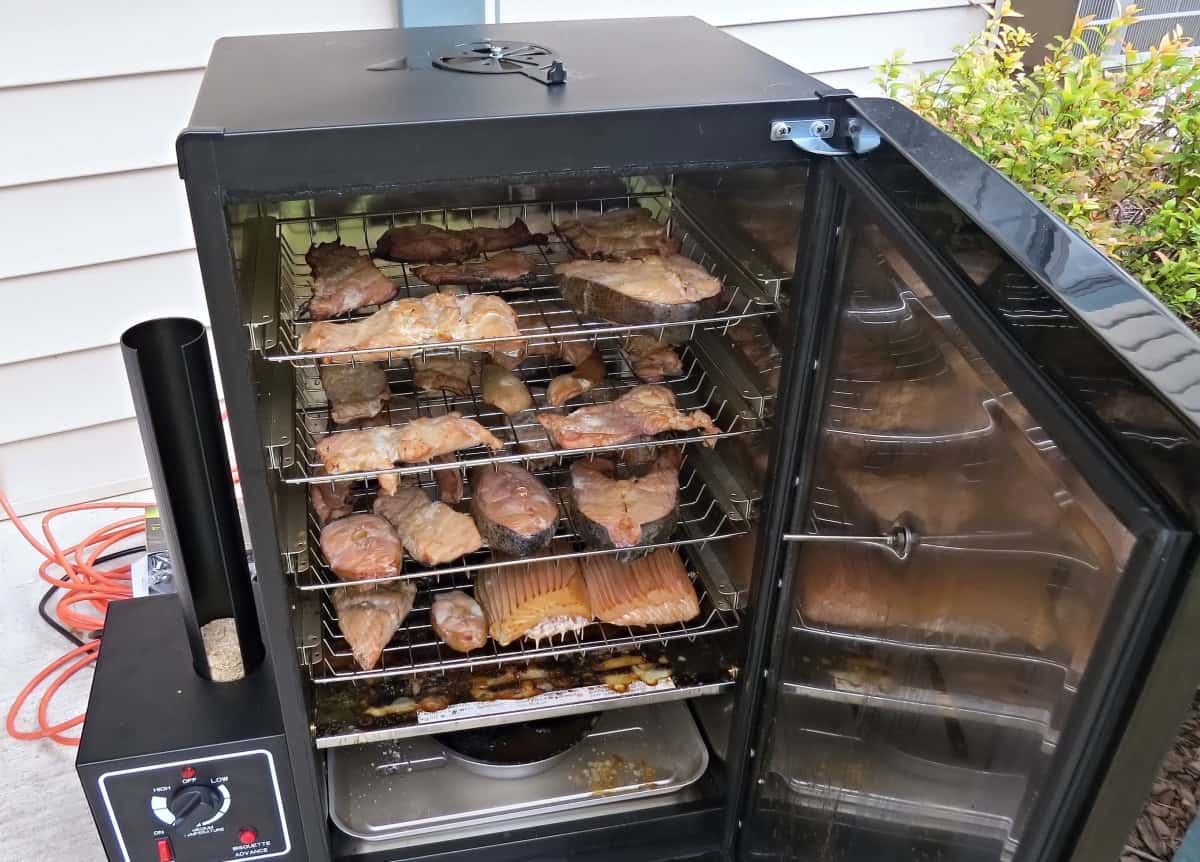
Are you leaning towards electric? Review this quick checklist to be sure.
What We Like
- Never runs out of fuel (barring a power outage)
- Easy to learn
- Doesn’t need constant attention
- Cheap to run
What We Don’t Like
- Smoke flavor is less intense
- No smoking if the power goes out
- Needs to be close to an outlet
- Less weather-tolerant than charcoal
Who are They Best Suited to?
- Smoking beginners
- People who don’t want to/can’t spend hours monitoring a smoker
- Anyone who doesn’t want to handle messy charcoal
- Casual or occasional smokers
You May Prefer Charcoal if…
- You like a strong taste of smoke
- You’re experienced with charcoal grilling / already own a charcoal grill
- You don’t have easy access to electricity
- You want to smoke away from home
Charcoal Smoker Summary — and Who Should Buy One?
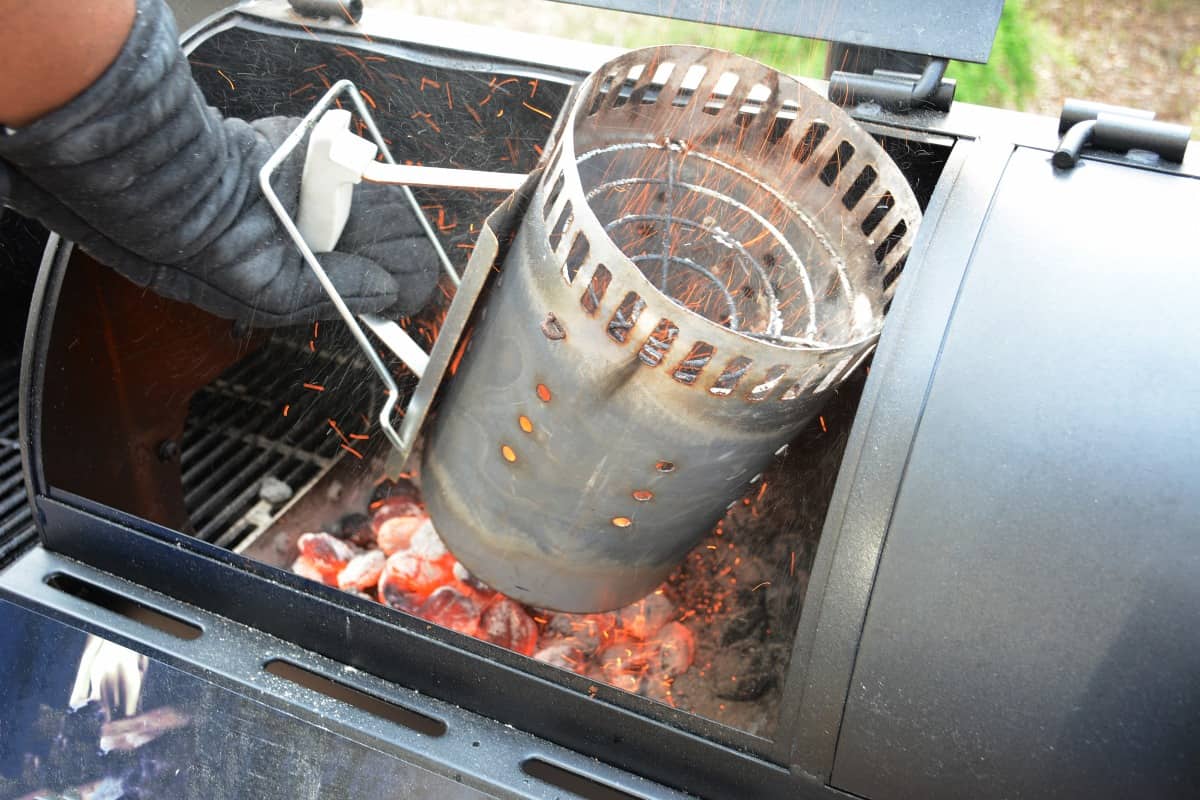
Ready to join Team Charcoal? Consider these points first.
What We Like
- Strongest smoke taste of any category
- Flavored charcoal options
- Feels more “hands on” than electric
- Tons of online support available
What We Don’t Like
- Takes longer to set up and get to temperature
- Harder to hold your target temperature
- Steeper learning curve
- Costs a lot more to run than other kinds of smoker
Who are They Best Suited to?
- Experienced charcoal grillers
- Barbecue enthusiasts
- People with patience
- Anyone who wants to smoke on the road (tailgating, cottage, etc.)
You May Prefer Electric if…
- You’ve never used charcoal before
- You have a convenient outlet, anyway
- You prefer a “set-it-and-forget-it” approach to cooking
- You’d rather have less smoke
Our Top Pick is…
There are great reasons to own either kind of smoker (or both, if money is no issue!), and it really comes down to your preferences and individual situation. But if we had to pick just one type… we’d go with charcoal.
For us, the flavor rewards of a charcoal smoker far outweigh the convenience of an electric smoker.
But, hey, after reading this article, you know what’s best for you. Make your choice and enjoy some great times and delicious food, whether it’s cooked over charcoal, electric heat, or gas.
For more information on smoking and grilling, browse the site for articles, or send us your questions via email, our online form, or over social media. And make sure to share us with your friends so that when you get invited over for a barbecue, you know it’ll be good.
Remember, if you have to have the blues, make sure it’s smoke!
Happy grilling!


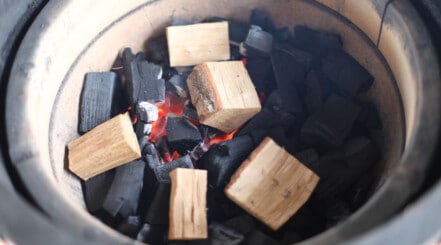
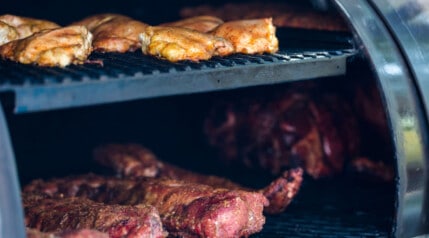

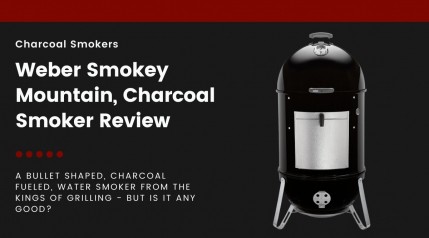
Can a bad digital set up on a smoker be changed for a better one? I can’t see anything on a bright day, can’t see the numbers properly. Can it be changed for a better digital one? If so, where can I get one? Or can it be changed to a dial like on an electric stove? Thanks.
Hi Jack. We’d need more details, as it’s not exactly clear what you’re asking? Is it a built-in digital display of your smoker? If so, then almost certainly not. But if a 3rd party one you are using, then of course you can replace it. Can you be a bit more specific please?
I am planing to open a smokehouse (for business) so I want to know witch is better an electric one or charcoal one ? Thanks, a lot .
Hi, Talal,
There’s no right or wrong answer, as is discussed above. However, for a ‘smokehouse’, most people would expect to see charcoal or wood burning smokers for a more ‘authentic’ taste.
One other plus for electric is that they are allowed on condo patios, at least they are on mine. Gas and charcoal are forbidden. And my smoker can convert to an electric grill too. I’ve used the grill function in winter when outside was covered in two feet of snow.